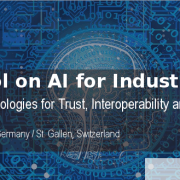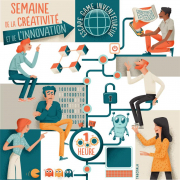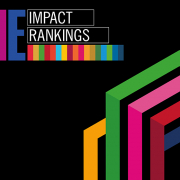IMT invests €1.6 million in the development of hybrid teaching
The Institut Mines-Télécom graduate schools are constantly transforming their teaching models in order to prepare students and professionals for the challenges of the modern-day world, while at the same time integrating new uses of technology. In this perspective, there has been an increased crossover of face-to-face and distance teaching methods over the years. They were rolled out on a large scale during lockdown to ensure continuity of training with the same pedagogical quality. IMT is upping the pace of this transition with its exceptional investment to acquire equipment and strengthen its IT infrastructure. The aim is to guarantee the start of the new academic year, whatever the health guidance may be at the time (number of people allowed in a given space, lockdown etc.), and also to speed up the implementation of new innovative practices and the pooling of certain resources across IMT graduate schools.
Going beyond the health context, hybridization constitutes a fundamental trend in the world of higher education. The IMT schools integrate innovative pedagogical models based in part on distance learning, to encourage greater student autonomy and better progress tracking.
Support the transformation
To support this pedagogical transformation, IMT is investing 1.6 million euros to strengthen the digital infrastructure of its schools and to train professors. More than half of this budget is dedicated to computer hardware and software for students, professors, and support staff. Certain practicals will thus be able to be carried out virtually thanks to simulators and emulators which carry out the experiment in real life by replicating the operations of apparatus as well as the physical properties and mechanical devices being experimented on.
The funds allocated will also make it possible to kit out classrooms (with cameras, etc.) and lay the foundations for multimodal teaching (online and face-to-face).
With this new equipment, the schools will be able to adapt their teaching (distance, face-to-face or hybrid) throughout the school year, depending on restrictions imposed by the health crisis, for example.
New digital pedagogy
IMT schools have already received extensive feedback on the most effective pedagogical practices, including (amongst others), flipped classrooms: they found that knowledge acquired autonomously was retained in greater depth and for a longer time. In addition, the last few months have shown the need to adopt an active pedagogy and to adjust teaching methods when knowledge is transmitted online. Courses are sequential and dispensed over short periods at different times; a theory session will be followed by a more interactive session where students ask questions via chats, multiple choice questionnaires and polls. These interactive devices help to keep students engaged throughout the learning process.
This hybrid teaching suits the knowledge acquisition modes sought by students, allowing each one to choose their own learning times and pace whilst maintaining interaction in person in informal settings.
« Hybridization of teaching does not mean that we just put everything online. IMT is keen to maintain a lively campus life as that is an integral part of training, from association activities and company-partnered projects to simple conversations between students and teachers,” »
says Odile Gauthier, Director General of IMT.
Mise en commun des ressources pédagogiques
Pooling pedagogical resources
Ultimately, the aim is to facilitate the sharing of pedagogical resources and collaborative work between schools so as to enable students and professionals to access all content created by teachers.
For the start of the academic year, students from IMT’s international partners who are unable to cross borders will be able to follow a dedicated program. In addition to the MOOCs (massive open online courses) taken by all students, they will be invited to study via online lessons. This is where resources will be pooled to ensure high-quality interactions with students. International students from the same time zone and studying the same core subject will be brought together on a course shared between the IMT schools. The task of teaching in different time zones will thus be shared amongst the schools.
In addition, various educational resources will be added to a pedagogical library designed to facilitate the creation of internal learning pathways within the IMT. These will be particularly focused around two common cores currently being developed: Sustainable Development & Social Responsibility, and Digital & Information Technology. Professors will choose the components to design a learning pathway and will determine the appropriate way of navigating it for their students: tutoring, gaining basic knowledge before starting a practical, etc. The pedagogical library will also allow the creation of themed communities of teachers for the main educational subjects at IMT.
The pedagogical library will also be open to students. They will be able to follow additional training courses independently and assess their level of knowledge.
This rationale of pooling resources will also be applied to vocational training with interactions between different modules.





















